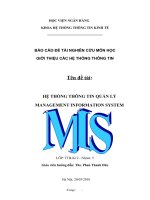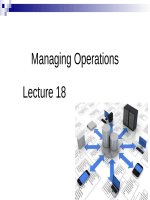Lecture Business management information system - Lecture 18: Managing operations
Bạn đang xem bản rút gọn của tài liệu. Xem và tải ngay bản đầy đủ của tài liệu tại đây (1.67 MB, 54 trang )
Managing Operations
Lecture 18
Managing Operations
n
The three major operational issues discussed are:
¨ Outsourcing information systems functions
¨ Information security, and
¨ Planning for business continuity
n
Due to mergers, the Internet, e-commerce, and the 9/11
attacks, the subject of computer operations has been
receiving a lot of attention
Managing Operations
n
Systems operations are important because, if they are
not professionally run (and backed up properly), a
computer or network crash could shut down a company’s
business for some period of time
n
Case examples include Microsoft, ANZ Banking
Corporation, Mobil Travel Guide, Eastman Kodak, Honda
Motor Company, Exult, Credit Card Fraud, Plymouth
Rock Assurance, and Household International
Today’s Lecture
n
Introduction
n
What are Operations
¨ Why Talk About Operations?
¨ Solving Operational Problems
¨ Operational Measures
¨ The Importance of Good Management
¨ What’s New in Operations
Today’s Lecture
n
Outsourcing Information Systems Functions
¨ The Driving Forces Behind Outsourcing
¨ Changing Customer-Vendor Relationships
¨ Outsourcing’s History
¨ Managing Outsourcing
¨ Offshoring
Introduction
n
Due to mergers, the Internet, e-commerce, and the
September 11 terrorist attacks, the subject of computer
operations has been receiving a lot of attention
n
Systems operations are important because:
¨ If
they are not professionally run:
Introduction..
n
n
A company could suffer a computer or network
crash that could shut down their business for some
period of time
It is not a trivial area, especially as companies become
increasingly reliant on networks and computers to run
their business
Industrial System Operation Management
Introduction…
n
Poorly run IS shops cause IS executives to end up
‘fighting fires’ instead of setting policy
OR
n
They find themselves looking for a job!
Introduction…
The main change in operations is the shift in viewpoint
towards managing operations (Figure 8-1):
n
Traditionally – managing inward, i.e.: managing one’s
own operations staff
n
Today – just as likely to mean managing outward =
managing relationships with (external) service providers
Introduction..
¨ Outsourced
IT service providers who have taken over
the day-to-day operational work
n
n
In some instances
Back to the future?
¨ Benefits
not realised
¨ Unexpected costs - $ and otherwise
What Are Operations?
Why Talk About Operations?
n
A Typical MIS Department Budget:
¨ 33%
Systems and Programming
n
70% Maintenance
n
30% New Development
What Are Operations?
Why Talk About Operations?
¨ 10% Administration
¨ 57%
and Training
Operations
n
Involve more $$$ than any other part of the IS
department
n
Very involved (difficult), challenging and rewarding
area
What Are Operations?
Solving Operational Problems
Operational problems are obvious to the entire company:
•
Response times are slow
•
Networks are down
•
Data isn’t available
•
Data is wrong
Slow Response Time
n
Slow Response time may be due to
A virus infection
n Some conflicting software programs that loads at
the startup
n Multiple security programs
n Recently installed software updates or drivers
n Third-party browser plug-ins
n Cluttered files over years
n A lot of items loading at the startup
n
Networks are Down
n
Networks are down because of
¨ Slow
bandwidth
¨ Heavy volume of data being transferred
¨ Power failures
¨ Improper
hardware
Data is not available because of..
Database server is slow
n Supporting network not working
n Too many requests for data on the
network.
n Improper design/requirement analysis of
database designs.
n
Data is wrong
Not a reliable data storage mechanism.
n Data without proper database formats.
n Confusing data
n
What Are Operations?
Solving Operational Problems cont.
n
Three strategies to improve operations:
1.
Buy more equipment
2.
Continuously fight fires and rearrange priorities,
getting people to solve the problems at hand
What Are Operations?
Solving Operational Problems cont.
3.
Continually document and measure what you are
doing, to find out the real problems, not just the
apparent ones.
Then set standards and manage to them = the
preferred solution
What Are Operations?
Operational Measures
n
External: What the customer sees:
¨ System uptime
¨ Response
time
¨ Turnaround
¨ Program
n
time
failures
= Customer Satisfaction
What Are Operations?
Operational Measures
n
Internal: Of interest to systems people:
¨ Computer
¨ Disk
¨ Job
n
usage as % of capacity
storage used
queue length etc.
Problems reported by external measures can be
explained by deviations in internal measures
What Are Operations?
The Importance of Good Management
n
The corporate culture created by IS management must
recognize and value good operations
n
Skills of an Operations manager = similar to that needed
in e.g. a factory
¨ Manager
must schedule work to
n meet delivery dates,
n monitor performance
n respond quickly to problems
What Are Operations?
The Importance of Good Management
n
The key to managing operations is the same as in any
management job:
¨ Set
standards
¨ Then
manage to those standards
n By finding an outstanding operations manager









